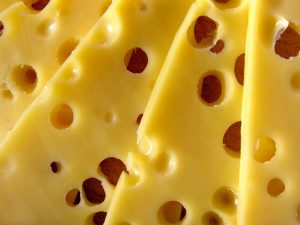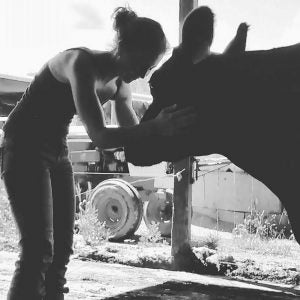In a world where we have a constant stream of information at our fingertips, it’s so hard to wade through all the opinions to get to the truth. As a farmer, it is both discouraging and frustrating to see all the false information being shared about what we do. I am so very thankful that there are so many other dairy farmers like myself sharing their story, sharing the truth.
I want to tackle some common questions I receive as farmer and share the answers from some of my friends.
Do dairy farmers even care about their cows?
I often see things from activists that state farmers do not care about their cows. That couldn’t be further from the truth. So, are cows just a number? Do they need a name to have value? While dairy farming surely is a business, it’s also a way of life in which we care and get attached to the cows in our care.
My friend Darleen shares in her blog post, “I would show you my father, who’s been a farmer from the day he was born 58 years ago, as he fights back tears and anger after having to put a respected Lady down, a Lady we just spent countless hours/days/weeks over trying to make better, exhausting every resource possible before having to give her a peaceful end. I would show him tired, sweaty, with a bandaged finger that’s missing a finger nail and hurts like hell headed back out to the fields in the summer heat and sunshine to make hay to feed the calves through the winter, after just literally working 16 hours straight for the last 10 days in a row. Those same hours that ravage his body year after year.”

Why is milk so cheap? Why is butter and cheese so expensive?
As a farmer, I am constantly being asked the reason why the prices in the store are what they are. The simple answer is that farmers are paid a set price for their milk at the farm. This price is something that we do not get to decide but is decided for us. Once the store purchases the product, they can set the price to whatever they would like. Some states have laws on how prices are set, while others do not. So why is milk so cheap in some states?
My friend Ashley explains in her blog post, “If you walk into a grocery store and you see milk for 99 cents a lot of questions can come to mind. For example, how can the store be making any money? How can the farmer be making any money?
“When these sales are happening a gallon of milk is a loss leader. A loss leader is a fancy, jargon-y word for a sale. A store puts something popular on sale. That brings in lots of customers. Behind the scenes, the grocery store pays a set amount for dairy products. When they move more gallons of milk than normal they might get a volume discount. However, that price isn’t as low as the sale price. They are losing money on the gallon of milk.”
What happens to all the poop from dairy cows?
It’s a question I get all the time. What I don’t think many folks realize is that cow manure is a valuable fertilizer that we use for our crops. Each state has different rules and regulations farmers must follow from how the manure is stored, to how it is applied to fields, when it is applied, how much can be applied, that the manure must be tested, that the fields must be tested — the list goes on.
My friend Annaliese explains more on her blog post, “Timing and proper manure management is important when it comes to fertilizing fields. We listen to the weatherman and avoid spreading manure when there is a possibility of rain. Spreading on soggy fields or right before a rainstorm could result in manure runoff. Nobody wants poop in their water. We also work with a professional who helps us evaluate our fields and determine how much manure to apply. I guess you could say we have a “poop professional.” The perfect amount of manure helps us grow the crops we use to feed our cattle.”
So now that we established that farmers care for their cows, that they are not getting rich off the dairy products in the store and that cow poop is a valuable product and not toxic waste.

Let’s talk about what is and isn’t in milk.
My friend Marybeth, a large animal veterinarian, explains how farmers keep antibiotics out of the milk supply on her blog post, “Every time the milk truck comes to pick up milk from a dairy farm, the milk is tested for antibiotics. If any antibiotics are found in the milk, the entire truck load of milk is dumped. If the milk truck has stopped at multiple dairy farms to get a full load, the farmer who let antibiotic-contaminated milk get into the milk supply has to pay for the other farmer’s milk.
“A sample of milk is taken for testing at each dairy farm before the milk truck picks up the milk. Every milk truck is also tested when it reaches the bottling facility. This is all for food safety — no one wants milk from sick cows in our food supply, and no one wants milk with antibiotics in our food supply! Farmers take good care of their cows, and keep very careful records, to make sure that this never happens.”
Seriously, just go read her entire blog post. There was just too much valuable information to just pick a small quote from.
Last thing I want to address is the myth that there is pus in milk.
Maria from Fitness Reloaded digs deep into this topic, “Pus in milk is not the same thing as white blood cells in milk.
“Neither organic nor conventional milk contains pus, but they both contain white blood cells, and they both need to pass the same regulations to be marked safe for consumption and reach the store.
“Your blood, my blood, a cow’s blood contains white blood cells — you know that, right? White blood cells are the ones who come to our rescue when an infection appears. So just like they hang out in our blood they hang out in milk too. Human breastmilk contains white blood cells. Same for cow’s milk as well.”
As a farmer, I only ask that you reach out to farmers to learn about how they do things and why. Not a single farm is the same. Not every farmer agrees with every little thing. The one thing that is the same is that the milk is safe and nutritious for your family regardless of which brand you buy or how many fancy labels are on it.
Krista Stauffer is a wife, mother of three, and first-generation millennial dairy farmer. Krista works side by side with her husband and kids on their 140-cow dairy.



